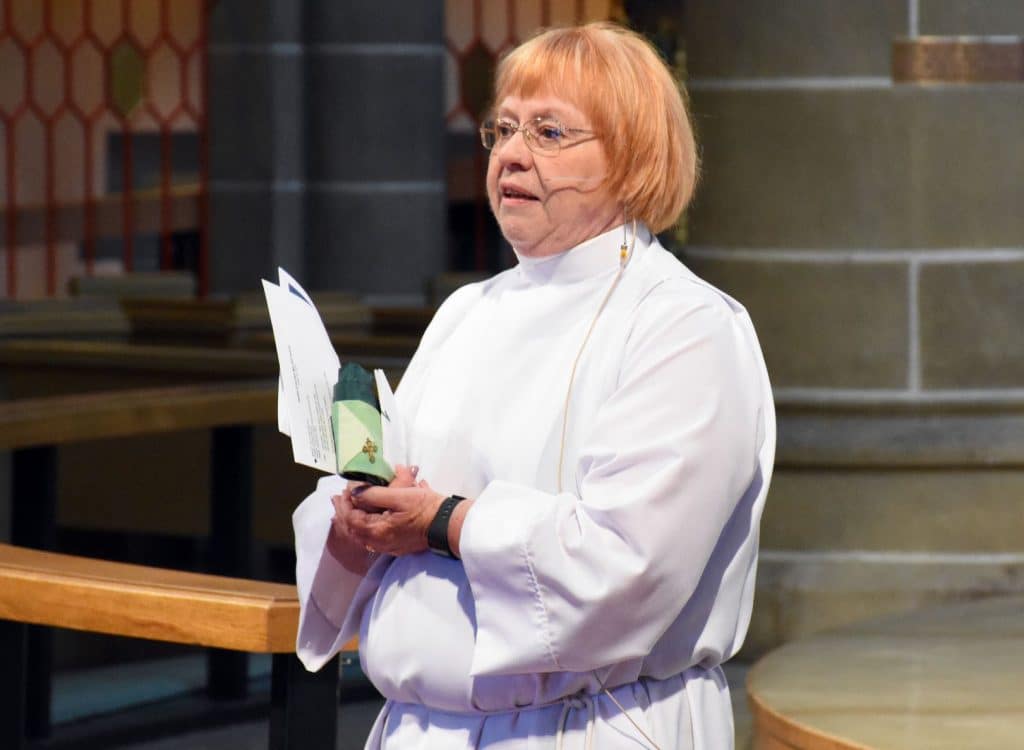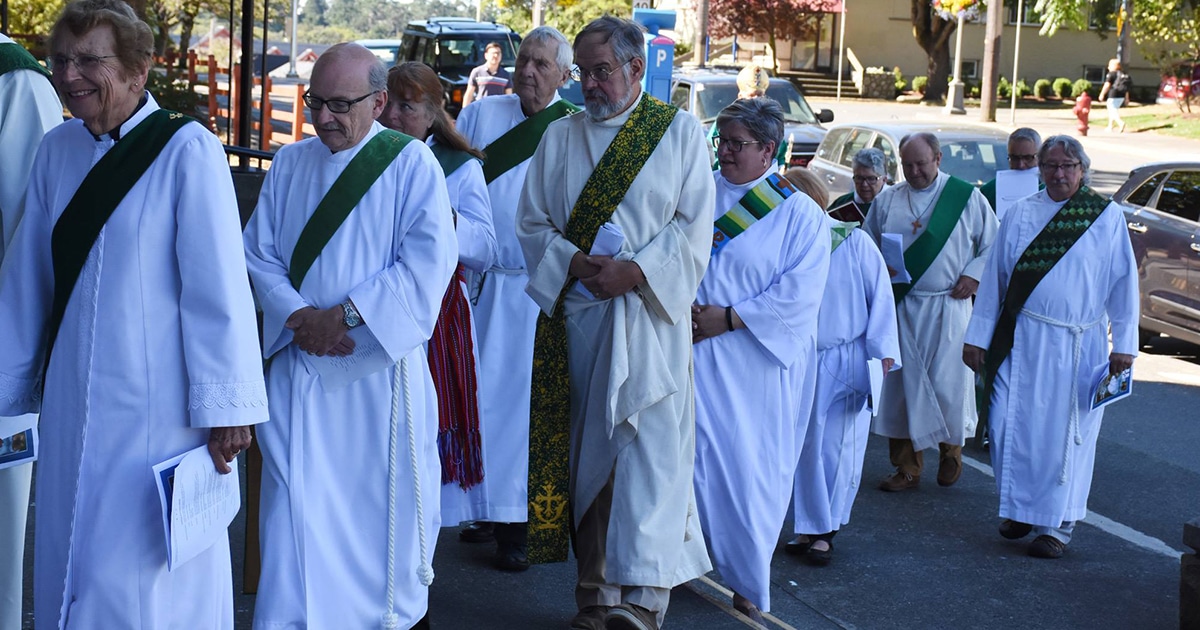The Association of Anglican Deacons in Canada (AADC) held their triennial conference from July 27-30 in Victoria, B.C. Two overarching themes dominated the conference. The first was the plight of marginalized peoples in communities and their struggles with poverty, homelessness, addiction, mental health, and food security. The second theme, reconciliation, included some overlap with the first and brought the experience and concerns of First Nations people to the fore.
In grappling with these challenges first-hand, deacons gained a renewed sense of their own mission. The Rev. Michael Shapcott from the Church of the Holy Trinity in Toronto, attending the AADC conference for the first time, came away struck by the scope of Anglican diaconal ministry.
“I was amazed at the diversity amongst the ministries of deacons, and the many important ways that the permanent diaconate has woven itself into the life of our church,” Shapcott said.
“Deacons are advancing the work of reconciliation. They are forging greater interfaith and ecumenical understanding. They are caring for those forced onto the social and economic margins while also advocating for social and economic justice. And as we were reminded on Sunday morning [at the closing Eucharist] … deacons have a powerful liturgical role in the worshiping life of the church.”
Addressing poverty and homelessness
A welcome and keynote address by federal Green Party leader Elizabeth May set the tone for the event with a reflection based around Leonard Cohen’s song Anthem.
Referring to a verse featured in promotion for the conference—“Ring the bells that still can ring / Forget your perfect offering / There is a crack in everything / That’s how the light gets in”—May challenged the church to consider the tension between the cracks and brokenness of the human condition and God’s perfect creation, and how we might reconcile the two.
Friday saw prolonged reflection on the brokenness of the world and the role of deacons in helping to alleviate it. The morning featured a panel of speakers who had experienced homelessness—an issue that Christ Church Cathedral faced firsthand during its prolonged experience with a “tent city” of homeless residents who lived outside the church from fall 2015 to summer 2016.
The Rev. Lisa Chisholm-Smith, AADC vice-president and children and youth ministry coordinator at St. James Anglican Church in Kingston, Ont., appreciated the “candour and courage” of the panel speakers and found a slide presentation on the experience of the tent city “very moving”.
“I have been at other gatherings where the voices of people with “lived experience’ are ignored by so-called policy experts,” Chisholm-Smith said. “These panelists acknowledged that they were uncomfortable addressing a gathering of church people and in turn they challenged us to move out of our comfort zones.”
For the Rev. Cheryl Kukurudz, executive assistant to the bishop and dean in the Diocese of Brandon, listening to panelists discuss their experiences with residential school, drug addiction, poverty, and sex work “hit me hard”.
“They shared their innate wisdom that only a life of experience could bring,” she recalled. “They urged us to go to meetings and speak up for the homeless and outcast, to use our voices as deacons to stand up and change policy: to make people more important than buildings, to get housing for people without first requiring they be detoxed, to hold the government accountable in protecting the most vulnerable of our country. We can help heal with dignity.”
“That was the panel that had me want to shout from a soapbox,” Kukurudz added. “It took such strength and courage for them to share their life stories, to a room of people who, in many ways, represents to them the trauma they have lived through.”
Moving forward on reconciliation
On the subject of reconciliation with Indigenous people, a common refrain at the gathering was the need to take concrete steps towards reconciliation. Dallas Smith, former president of the Nanwakolas Council who recently ran as a candidate for the B.C. Liberals in the provincial legislature, spoke on the need to accept apologies and for Indigenous and non-Indigenous people to move forward together.
Bishop Logan McMenamie of the Diocese of British Columbia detailed his 470-kilometre journey from Alert Bay to Victoria, throughout which he asked elders in local First Nations for permission to re-enter the land. Melanie Delva, reconciliation animator for the Anglican Church of Canada, described her own journey and recovery from ideas of white privilege.
The Iona Report
Part of a presentation on Friday afternoon included discussion of The Iona Report on the diaconate in the Anglican Church of Canada, published in October 2016. Conversing in table groups, delegates shared their experiences of what dioceses had done with the report since the last General Synod.

In reflecting on competencies for diaconal ministry, outlined in the report, the delegates acknowledged the diversity of contexts and opinions from diocese to diocese. They also considered the possibility of continuing education funds for deacons.
“That was a huge topic for many people,” The Rev. Canon Nancy Ford said of the latter. “Some dioceses have [continuing education funds] for their deacons. Others don’t, and that’s a shame, because when you’re working at the margins on the edges of things, you do need educational support and other kinds of support …
“In terms of academic education, there needs to be support because the cost is not always something that the church supports, and it could be a stumbling block for someone who’s called into the diaconate … We need to look at how we fund education.”
Ford, who was elected president of the AADC board at the conference, characterized the overall reaction to the Iona Report as positive, with many delegates finding it useful as a means for their dioceses and bishops to assess spiritual growth and development.
“The whole process of looking at how we assess and form deacons—a lot more people felt that this was a very useful document to feed into that,” Ford said.
Building a ‘national community among deacons’
A highlight of the conference for many delegates was the chance to network with other deacons from across the country, and to continue building closer national ties.
Morris pointed to the election of new directors to the AADC board as a positive step in that direction.
“There are some very good voices I think that are on the board now, who will help to galvanize the association and bring it some new life and some new ways of looking at issues for the church—not just pertaining to deacons, but pertaining to the overall mission of the church and the role of the diaconal community nationally in that,” he said.
Organizers of the conference, such as the Rev. Wally Eamer, are now awaiting responses to evaluation forms on the event that were sent out to delegates. Any decisions based on the feedback will likely be made by the AADC board in September.
“I think what’s going to come out of it is a much greater sense of the need for national community among deacons,” Eamer said.
“We tend to be rather split up into dioceses, and even there, we have different ministries and we’re scattered geographically. In Toronto, it’s relatively easy to meet with each other; in a large part of the country it’s not … I think for many of [the deacons], they had a real sense [at the conference] of being part of the national community, and I think what will be important is that is supported and enlarged.”
An estimated 70 registered delegates attended the conference, which took place at a downtown Victoria hotel and included opening events and a closing Eucharist at Christ Church Cathedral.
Interested in keeping up-to-date on news, opinion, events and resources from the Anglican Church of Canada? Sign up for our email alerts .

